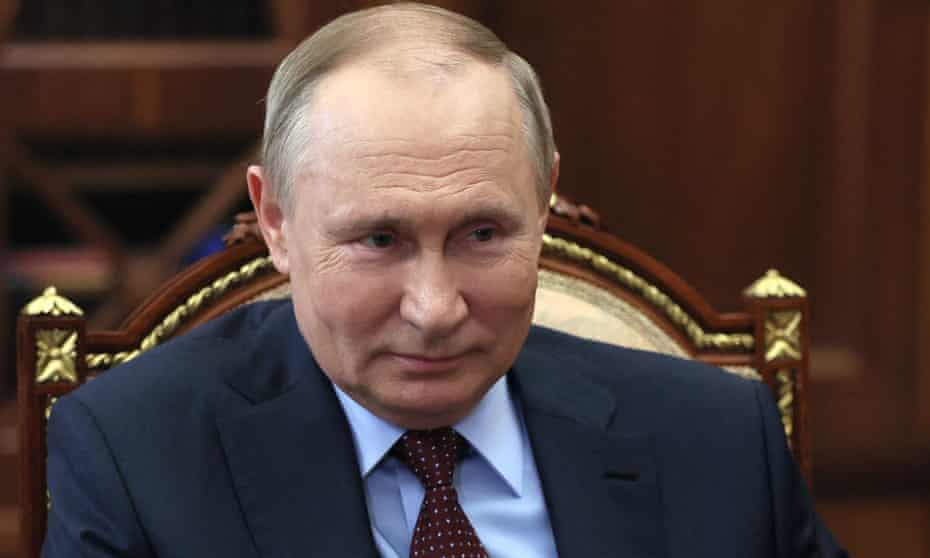Analysis: Rising stakes seem to lure the president deeper into the Ukraine war, with polls backing him and his officials compromised

The first week of Vladimir Putin’s invasion into Ukraine has not gone to plan, with the Russian military admitting the deaths of 500 soldiers (Ukrainian estimates are higher) and western sanctions dealing a body blow to the Russian economy that will only grow worse in the coming weeks.
And yet the Russian leader seems even more invested in his campaign to conquer Ukraine, lured in by the growing stakes of the most ambitious and dangerous gamble of his 22 years in power.
“Putin’s in the corner,” said Andrei Kolesnikov of the Moscow Carnegie Centre. “It’s him against the whole world.”
Despite some early defeats, Russia maintains military superiority in Ukraine, where its firepower is likely to give it the edge as the war continues. But the question remains how far Putin is willing to go in bombing Ukrainian cities, in resisting western sanctions, and in punishing those at home who dare to call for peace.
Much further, say Kremlin watchers.
“I think it’s going to get worse,” said Kadri Liik, a policy fellow at the European Council on Foreign Relations. “For Putin, the incentive is to escalate. He has gone all in. I cannot see him modifying his war because that would be a loss in his eyes.” Any chance to come to an agreement with western powers had probably passed, she said.
“And I think it’ll be pretty full-blown dictatorship at home. You can see it coming.”
Western officials believe the risks are high for the Russian leader. While the rule of thumb in diplomatic circles was that Putin would be in power for the next decade, his appetite for risk has raised questions about whether he could provoke a public backlash or an elite power struggle earlier, especially as Russia’s economy enters recession.
For now, all the public data suggests Putin enjoys popular support for the war – in which the major cities of Kharkiv, Kyiv and Mariupol have been shelled.
Employees of several Russian pollsters have said that they are concerned that the robust numbers in support of the war could embolden the Kremlin and prolong the conflict.
Russian state television has largely stuck to its script that the “special military operation” is going according to plan. State TV hosts have decried “fakes” about the Russian army enduring heavy losses, or missile strikes against population centres, trying to get a step ahead of the disturbing images coming out of the war through social media.
And with an eye to a potential backlash over the war, Russian lawmakers have passed a tough new law that carries a punishment of up to 15 years for publishing “fakes” about the Russian military, meaning information not distributed by official sources.
It is clear that the Russian government has always been worried how this war would be perceived by the public, especially if it begins to go poorly.
“Maybe some people can open their eyes and see that it is Putin who is responsible for the situation and his ambitions are not the ambitions of the whole nation and the war was in vain, the war was unjust,” said Kolesnikov. “But that’s only a hypothesis because for now, most of the people support this operation.”
Putin has put his top advisers on television to imitate a public discussion about a war that has been a surprise for many Russians. Beyond selling the war to the public, the televised show also tied many of those officials closer to Putin, making it harder for them to later denounce the war or act as if they had not lobbied for it.
“You can’t discuss the situation in rational terms,” said Kolesnikov. “All these people at the very top are in one boat, one submarine with Putin and they don’t have an exit from it right now.”
While some have whispered about dissent in the Kremlin ranks, a few western officials have openly called for it.
In an extraordinary statement, Lindsey Graham, a US senator from South Carolina, asked: “Is there a Brutus in Russia?”
“The only way this ends is for somebody in Russia to take this guy out,” he said in a tweet.
Dmitry Peskov, a Kremlin spokesperson, called the remarks a “massive hysterical Russophobic fit.”
But they will fit neatly into the Russian propaganda about the recent sanctions, which Russia claims are aimed more at punishing Putin and seeking regime change than in trying to end the war in Ukraine.
The war will now enter its second week. Nato’s Jens Stoltenberg has warned that the coming days are “likely to be worse” as Russia begins to turn to its advantage in air power and artillery to break into resisting cities. And after Putin spoke with Emmanuel Macron, a French official said that Putin was “prepared to go all the way”.
